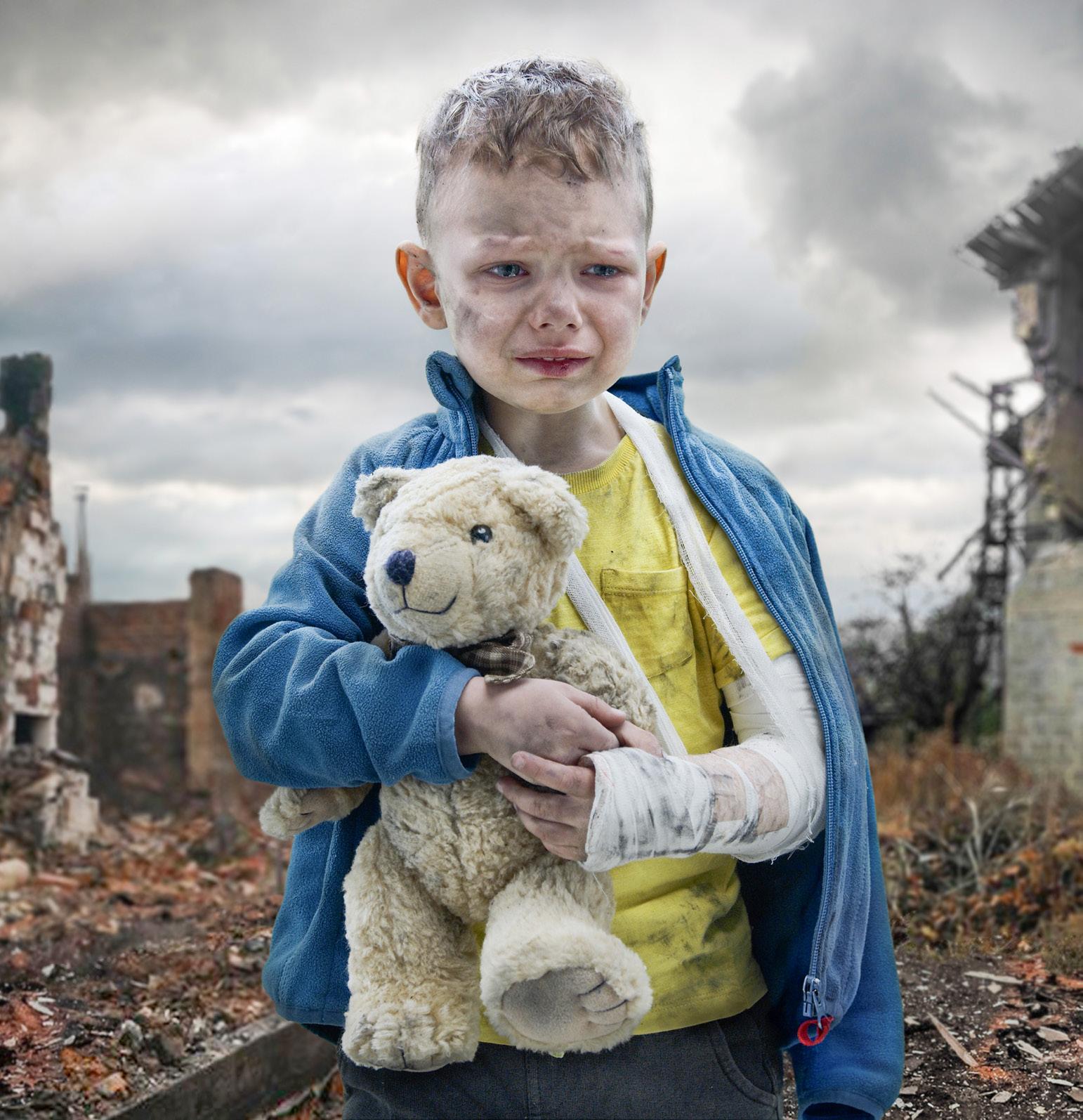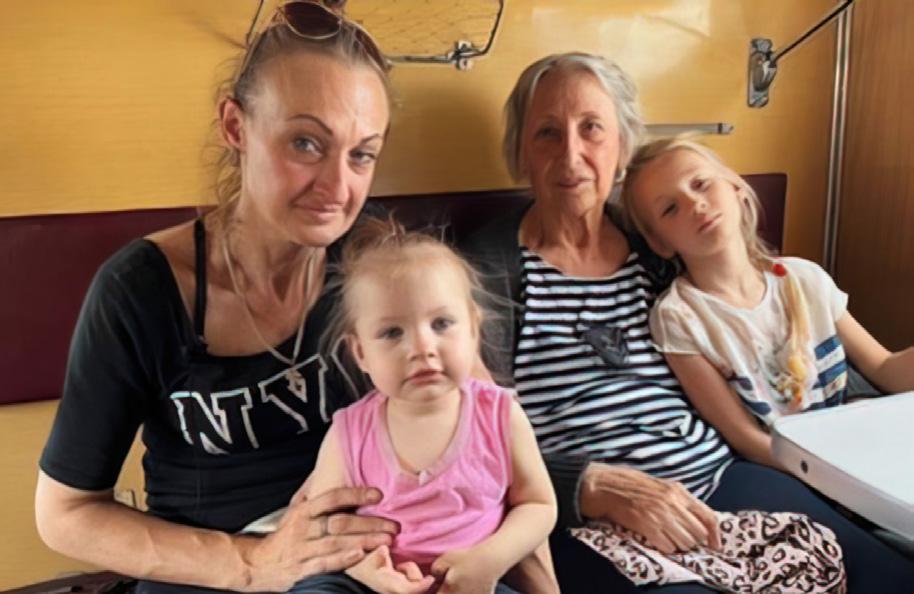
16 minute read
ANITA DEYNEKA
from December 2022 Connections
by wtriggs
GLOBAL VOICES
Vulnerable Resource A Valuable and
Advertisement
ANITA DEYNEKA
Ordered by Vladimir Putin, the Russian military launched its heaviest wave of attacks on Ukraine in October, since Russia invaded that nation on February 24. Across Ukraine, missiles, rockets, drones and other weapons blasted 30% of Ukraine’s energy infrastructure.
Those same missiles, rockets, drones and other weapons destroyed children’s parks, schools, hospitals and other civilian targets in cities which were beginning to regain a sense of normalcy. Now, our ministry partners in Ukraine report widespread power and water outages, as Ukrainian responders work feverishly to restore what has been destroyed as temperatures are already near freezing at night.
Thousands of children with families, and especially those without parental care, are again at very great risk. Many now again shelter in frigid underground basements and metros. Their urgent need is to not only escape active war but also lifethreatening temperatures as thousands more homes and evacuation centers are without heat and water. The plastic tarps many had put on their blown-out windows and bullet ridden roofs are no longer sufficient. The trauma experienced by children and families, evacuated after many months of living in basements and experiencing unspeakable horror, is again rising and terrifying.
A Family for Every Orphan, with which I serve as a missionary of Mission Eurasia, is primarily seeking to serve orphans and other vulnerable children and families. Sixty percent of Ukraine’s 70 million children have been forced to leave their homes, since the war, initiated by Russia, began February 24. More than half a million children have reportedly been deported to Russia and
their fate and status is currently unknown. Some of them were adopted by Russian people, who were instructed to change children’s names, so that Ukrainian links could not be found in their roots. About 20% of Ukrainian children remain in areas of the country still under Russian occupation, including in some of the most wartorn regions. Less than a year ago, these children went to school, had food and shelter, played games and lived normal lives. Today countless children are forced to sit in basements for months without means of subsistence, warmth and sometimes water. On the verge of survival, they face high risk of death and urgent need of help. Save Ukraine—a network of churches, Christian organizations and leaders across the nation—is the primary partner of A Family for Every Orphan. Their mission is to rescue the most vulnerable from combat zones and help them rebuild their lives—including orphans and other vulnerable children. They also provide special assistance to those with disabilities—currently, there are more than 164,000 children with disabilities living in Ukraine. The Save Ukraine network has set up 24-hour hotlines to which they respond, providing evacuation, food and other care, given with the hope and comfort of the gospel. When families decide to evacuate, they often don’t have enough time to pack—and must leave their belongings at home. Many wander without any means to survive, including money, food, clothing, hygiene products. Those who had enough time to grab something have small backpacks with the most necessary items. Currently, a vital project is the “Save Me” Rescue Packs for children. These rescue packs include basic food items, water, safety and hygiene kits and a children’s New Testament. One backpack is enough to provide these necessities for three days, while a child is first evacuating. There is also enough space for a child to take one favorite toy. Mission Eurasia is providing children’s New Testaments for the backpacks. We know that many times the whole family reads and cherishes God’s Word.
Another critical need is to help with housing in safe places, where evacuees can temporarily live, rest and recover. Save Ukraine is currently constructing temporary structures for people displaced from their homes. As the war subsides and more people can return home, Save Ukraine will also build small modular frame houses, where families can live short-term—and some long-term. Responding to its 24/7 hotlines, Save Ukraine is rescuing up to 500 people daily from active combat zones and taking them initially to one of 15 rescue hubs in safer places throughout Ukraine. Workers with Save Ukraine are grateful for the five armored cars, 22 vans, 11 ambulances, six buses and a gasoline tanker they now have, and they thank God for all who have helped with this equipment, which will enable to them to help many more people. Since the war began, Save Ukraine has evacuated 70,000 children and families—including children from 22 orphanages—taking these children to places where they can sleep peacefully, and not wake up shaking from explosions and sirens. Save Ukraine members have also provided food packages for more than 81,000 people and helped thousands of adults and children with safe housing in Ukraine and abroad.

Even as Russian military, relentlessly attack Ukraine, with no regard of who is in their path of destruction, Save Ukraine and its teams are bring hope and help to Ukraine’s most vulnerable and valuable resource—her children.
c
After the Russian military approached Lysychansk, life changed forever for Alla, her two little daughters and her mother who suffers from the aftermath of a stroke. For four months Alla and her family hid in a damp basement and as a result came down with pneumonia. It was impossible to receive medical care since the Russian military had bombed the nearest hospital. Still, despite all the difficulties, illness and pain—Alla’s arm had healed improperly from a severe fracture—she managed to cook meals on the fire amidst the shelling so that her family would not starve. She was cooking when a shell landed in her house. All five floors were blazing, and concrete slabs were collapsing from the ceiling and walls. There was chaos, screaming, dead and wounded people all around. Alla quickly gathered her documents from the now bombed-out apartment, realizing she and her family must escape. Our Ukrainian colleagues were nearby driving an evacuation bus to help the hurting. This Save Ukraine team made every effort to calm the children and their relatives and were able to take them to safety. That day, on the eve of the occupation of the city, volunteers evacuated 22 people from Lysychansk. Currently, Alla’s family is in western Ukraine and an A Family for Every Orphan partner ministry team is taking care of this family.
A Very Good Christmas, Jeeves
Vijai John Kuruppacherry

My favorite author of humorous fiction is P.G. Wodehouse, a British (later American) writer whose oeuvre was described by Alexander Cockburn as standing at “a slight angle to the universe, unreachable by almost anything but laughter itself.” In his complex plots, a protagonist is faced with situations so far-fetched and compounded on themselves that the reader wonders what if anything could extricate the poor “toad beneath the harrow” from such a mess.
Among Wodehouse’s most celebrated works are those focused on the amiable, muddled young gentleman, Bertie Wooster, whose universe is filled with people who, in their misguided pursuits to such varied ends such as courtship, making money, and getting even for a trifling, land him in hot water at every turn.
These include equally hapless friends, young women with a tendency towards practical jokes and fiery temperament, aunts who frequently enlist him in dubious schemes calculated to “bring his grey hairs in sorrow to the grave,” clergymen of various stations—curates, vicars and bishops and other representatives of authority such as magistrates, police constables and retired headmasters. To redeem such a one, only one person of infinite wisdom and sagacity proves equal to the task—Bertie’s personal valet, Reginald Jeeves.
A typical plot begins with something Jeeves may want his employer to do, such as travel around the world on a cruise, with which Wooster would immediately refuse to comply. Subsequent events would render his acquiescence absolutely necessary, after Jeeves has undone the Gordian knot in which Wooster finds himself, but not before the incredible farce has outraged the reader in the best possible manner. During this sequence of events, Wooster would often act contrary to Jeeves’ direction, from either a desire to put Jeeves in his place or misplaced confidence in his own wisdom, and inevitably be forced to concede and put his trust in “a higher power,” namely Jeeves.
The Wodehousian idyll in the form of perpetually sunny gardens on the grounds of ancient castles, replete with feasting tables of delectable French dishes cooked by temperamental chefs, has been compared by Christian thinkers to Eden. This happy state is threatened often by powers that would usurp it, and to be banished from it is to be confronted by aunts with flaming swords. The one all-important thing missing from this pastiche is sacrifice, at least on the part of the one who “does all things well,” the valet Jeeves, who otherwise incarnates into the world of the noblesse, at ease with both classical allusions and modern scientific thought, but unperturbed by the “privations” that befall them. The other characters seem to sacrifice plenty, to great comic effect.
I can’t stretch these stories to be true parables. Jeeves, after all, is manipulating events if only partially to satisfy his selfish interests. He sacrifices nothing and shows no remorse in having his employer go through public humiliation to accomplish his desired end. But it is in the middle, between the presentation of the initial problem and its resolution, that I find myself in familiar territory—in the desire to control the destinies of everyone I care about, the petty dudgeon towards those with better understanding or experience, and the vanity that convinces me that I am better than I could ever hope to be.
Events that transpire convince me that his ways are higher than mine, his thoughts deeper. If a resolution presents itself, as it sometimes does, I’m enabled to see the Gordian knot that bound me. I look back on how I devised plans, dreamed dreams, and mobilized resources to loosen it, but God presents a different plan. If we can relax for a moment and see it all unfold, we may be outraged by its incredible farce. What could one expect from such a God, who incarnated into human form, lived among fisherfolk reeking of the day’s catch, ate with unwashed hands, and stumped the learned scribes of his day with stories so simple a child could comprehend and yet so layered that they confounded them?
Scripture presents Adam as a being made to rule the good land God made as God’s representative, but corrupted by the serpent, infecting him and his progeny with its venom that results in death over every human ever made. We see the ongoing interventions by God to carve out little Edens through Noah, Abraham, Moses, David, and others through history, resulting in short-lived victories that cannot seem to deliver God’s promise that the son of Eve will crush the head of the serpent’s “offspring.” Rulers who once showed promise are now revealed to be infected by the venom just as much as anyone else. Others take matters into their own hands, wresting control of kingdoms, allying with foreign empires, and finally turning out to be exactly like the nations that God replaced to make room for them. Called to be a holy people, Israel returns to its sinful ways, and is banished once again from the good land God gave them. God keeps his promise through the most unlikely event imaginable, a baby born into poverty, among animals, with the powers of darkness gathering to destroy him. When they finally succeed, they

find themselves outwitted by his resurrection, with the key to death and Hades in his hands.
To marvel at the Incarnation is to be reminded of our sin and the loving sacrifice of God that redeems us. But to view one’s sin in contrition in the light of God’s good news is to be also lighthearted. Fleming Rutledge writes in her book The Crucifixion, “It is with a sense of lightheartedness that one comes before the mercy seat of God, but none can understand this until the light of grace dawns upon them.” She describes as an example of this paradoxical response to the Incarnation the composer Bach’s cantatas, with “movements back and forth between deepest, heartwrenching lamentation and exuberant, life-affirming dance forms, suggesting the experience in life of having one’s deepest fear and shame understood by someone else in a context of promise and hope.”
Wodehouse’s world fills me with laughter and longing because it invites me to a resolution that, held in the context of all that went before, is utterly delightful. The stakes are not high but exaggerated—the prospect of being banished from the table of the chef Anatole, “God’s gift to the gastric juices,” fills his patrons with fear and trembling. We who inhabit a world with far more consequential results to our sin know that it takes God in Christ to save us from the serpent’s jaws. When we are rescued, we see that he has spread a table for us in the presence of our enemies, and our cup overflows, because “we have come to Mount Zion and to the city of the living God, the heavenly Jerusalem, and to innumerable angels in festal gathering.” (Hebrews 12:22)
COMMUNION AT COLLEGE CHURCH DECEMBER 4
Hark Now Hear
Keith Bodger
In the mid-1980s when I was in my early 20s, each Christmas, for about four years, my friends and I would sing Christmas carols at a nursing home. The local newspaper would print the lyrics to the carols, and we’d use those printed songs to guide us through an hour or so of singing on a Friday night. The residents seemed to enjoy this unprofessional group of singers who were simply being nice to others at Christmas time. We would sing traditional carols such as “Angels We Have Heard on High,” “Silent Night” and “Jingle Bells.” But the one song that stood out to me was the lesser known “Mary’s Boy Child.” “Hark now hear the angels sing” was at least something with which I was familiar because of the other carol, the “Hark! the Herald Angels Sing” one. But it was the next phrase, “a new King born today” that confused me. I really didn’t know what they were singing about. Who was this king? Why didn’t I know of this king? What was his name? On what day was he born? It says born today but what specific day? Did it mean the Friday night we were singing? And what about Queen Elizabeth? Would she still be queen if there were a new king born today? It just didn’t make sense.
“Mary’s Boy Child” had a revival of sorts in 1978 by musician Boney M, and likely got a lot of air play at Christmas time. I expect that’s how I knew it. The song was originally recorded by Harry Belafonte in 1956. It was a calypso Christmas carol, written by Jester Joseph Hairston from North Carolina. According to Wiki, Hairston was a leading expert in Negro Spirituals and a choral singer/ conductor. His grandparents were slaves. Hairston wrote the song with a calypso rhythm for a Hollywood choir. I don’t expect my group of friends and I did the calypso rhythm justice, but we sang it. Or, at least, I tried to sing it.
The song made me cry. I would move my mouth to form the words, but I could not often sing out loud because I was crying. What made me cry? Was it the lyrics? Was it the music? Was it the Holy Spirit tapping me on the shoulder? I don’t know. But I looked forward to singing this carol each Christmas, even though I didn’t understand it. The chorus made no sense. At that time, I didn’t go to church, and I did not know Jesus. Look at the words of the chorus: “And man will live forevermore because of Christmas day.” This lyric baffled me. Man does not live forevermore. We die. I knew that. I knew people who had died. Even though we had Christmas Day, people still died. I just didn’t understand it. What was it about Christmas Day that caused people to live forevermore? The song was illogical.
But I cried. The nonsensical lyrics didn’t stop me from loving that song. So, I would sing along, to the extent I could, until the emotion overwhelmed me, and I would have to mouth the words and discretely wipe away the tears.
Eventually, the popularity of “Mary’s Boy Child” waned, and I didn’t hear the song anymore, until about ten years ago, when I found the song on iTunes and bought it. Now it’s a regular part of my (year-round) playlist. And now I get it. The angels did sing. A new King was born, and his name is Jesus Christ. And man will live forevermore because Jesus, our Savior, was born and we celebrate that on Christmas day.
And I still cry.

“Hark now hear the angels sing, a new King born today. And man will live forevermore because of Christmas Day.”
ARTIST SPOTLIGHT MARR MILLER
Born to missionary parents in the Belgian Congo, Marr spent most of his formative years in the Congo with home assignments in Wheaton and Alma, Nebraska. His last two years of high school were in Wheaton. College began at John Brown University (JBU), interrupted by service in Vietnam followed by more studies at JBU, the University of North Carolina and DePaul University. His MBA is from Keller Graduate School. Marr worked for a photo studio before returning to Africa with his wife, Mary, as short-term missionaries with AIM International in the then renamed Zaire. His main artistic interests are nature related, especially wildlife, scenic and landscape, although event photography seems to be the usual assignment. Lately, he does video work, which expands the art to include audio. He has worked as an administrator with a mission agency, an HR director for a manufacturing firm, at a mortgage company and is now retired from property management. Yours, O LORD, is the greatness and the power and the glory and the victory and the majesty, for all that is in the heavens and in the earth is yours. Yours is the kingdom, O LORD, and you are exalted as head above all. 1 CHRONICLES 29:11


PHOTOGRAPHY


PRAYER GATHERINGS ONLINE & IN PERSON
Call the church office or email info@college-church.org for details on these prayer meetings.
Sunday Morning Prayer 8:15-8:40 a.m. in C101
Monday Morning Prayer 6:15-7:15 a.m. Board Room
Wednesday Night Prayer (Zoom only) 7-8 p.m. DECEMBER 7: Steve & Lois Dresselhaus
DECEMBER 14: Jim & Nan Green
DECEMBER 21: TBD
DECEMBER 28: TBD
Friday Prayer for the Persecuted Church (Board Room) 12-1 p.m. Led by Wil and Lorraine Triggs. The weekly prayer guide is also available at our website: https://bit.ly/3vzdcAz
HANNAH PRAYER FELLOWSHIP
will not meet in December. Meetings will resume in January.
BARNABAS PRAYER FELLOWSHIP
will not meet in December. Meetings will resume on January 18.
AARON-HUR PRAYER FELLOWSHIP
will not meet in December. Meetings will resume in January.
Our Prayer Pulse email goes out every Monday. You can get prayer updates via that email. Sign up by clicking “Enews signup” on our website. If you already receive other emails from College Church, click “manage my preferences” at the bottom of any email and select Prayer Pulse to add yourself.



